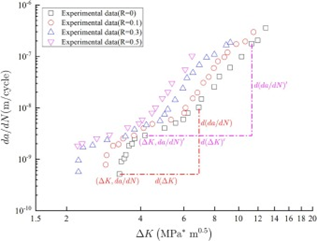Jincai Ye, Pengfei Cui, Wanlin Guo
Engineering Fracture Mechanics ,2025,111417
Abstract: This study presents a neural network-based incremental learning scheme designed to predict fatigue crack growth rate (CGR) against the stress intensity factor (SIF) range () in the near-threshold region. CGR datasets are generally small, with most data concentrated in the Paris region. Near-threshold region data are even more limited due to the significant time and labor required for their acquisition. To better handle small datasets, we designed a machine learning model incorporating multiple incremental information, demonstrating superior prediction accuracy compared to traditional fatigue crack growth models across various material datasets, particularly in the near-threshold region. Given the inherent uncertainties arising from environmental factors, material processing variations, and limited training datasets, the prediction model may not always perform effectively. To overcome these challenges, we implemented a correction strategy that leverages minimal experimental CGR data to correct the model. This approach significantly enhances the prediction accuracy of the model. Moreover, by incorporating the fatigue crack closure model, was unified to the effective SIF range , enables simultaneous correction of CGR data across different stress ratios. Finally, the effectiveness of the correction strategy was further discussed for high-entropy alloy under different temperature conditions. This study significantly enhances prediction accuracy in the near-threshold region and presents applicability to CGR data under various conditions, providing a time and cost-efficient data acquisition approach for engineering applications.

Link: https://www.sciencedirect.com/science/article/pii/S0013794425006186